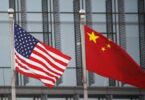Matthew Henderson
Despite everything, the Government is still clinging to the idea that we mustn’t upset Beijing by suggesting that a lab leak may have caused the pandemic. So sensitive is Whitehall to potential slights that Matt Hancock’s memoirs were censored by the Cabinet Office, eliding passages suggesting that the emergence of a deadly new virus practically next-door to the Wuhan Institute of Virology was anything other than “entirely coincidental” – the Government’s apparent position.
This is emphatically not the official position in the USA, where various federal agencies and congressional committees have all been tasked at one point or another with assessing the origin of the virus. Just last week the director of the FBI noted that the “most likely” origin was a lab leak, while yesterday the US Select Committee on the Coronavirus Pandemic declared that “mounting evidence continues to show that COVID-19 may have originated from a lab in Wuhan”. America is not alone in its frankness. Australia was the first country to demand an independent inquiry into the origins of the pandemic in April 2020. Beijing’s response was swift and furious, imposing trade restrictions on a wide range of Australian exports. The Australian government held to its line, the CCP’s aggressive bullying was exposed to damaging international scrutiny, and other liberal democracies were encouraged to join demands for responsible information-sharing.
And yet Britain is still hesitant to enquire too closely about the cause of a pandemic that caused substantial economic and social damage. Internationally, London is increasingly isolated in its official unwillingness to confront the truth about China, and not just in matters to do with the pandemic. The Government has belatedly constrained some aspects of Beijing’s well-established penetration of the UK’s core national infrastructure, and Parliament has taken a formal position in condemnation of abuses in Xinjiang. But despite indications of greater foreign policy realism in the 2021 “Integrated Review”, Britain persists in a policy of pragmatism even while China is engaged in a campaign against the international rules-based order and universal democratic values.
This vacuous ambiguity is steering Britain into a more and more unsustainable position. Despite rising tensions over Taiwan and growing evidence that China tacitly supports Putin’s war in Ukraine, it seems that even referring to China as a “threat” may prove too abrasive for the planned revision of Britain’s foreign policy strategy. This is not only an inexplicable misalignment of our interests and those of our closest partners. It is something far more reprehensible; groundless confidence that we can “manage” relations with an untrustworthy and ruthless global rival. It is true that relations between Beijing and its critics have deteriorated as a result of their frank honesty. But a more realistic strategic understanding of the CCP’s aims and intentions has increasingly coalesced. In some cases, bilateral relations with Taiwan have also strengthened.
Britain’s policy of attempting to avoid looking too closely at the threat, let alone risk from China is deepening its reliance on a power increasingly hostile to the international order that sustains our prosperity. Failure to distinguish between friends and foes must at all costs be avoided, as the consequences can be irreversible. The geopolitical question the Government faces is clear: are we drifting onto the wrong side of history?







